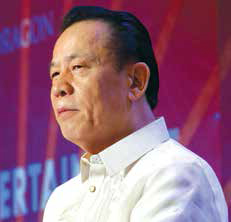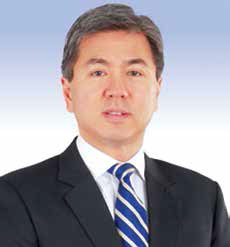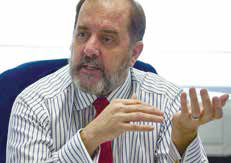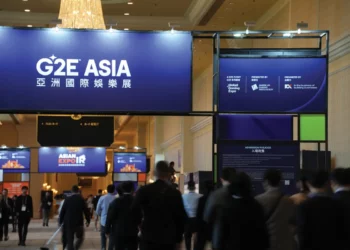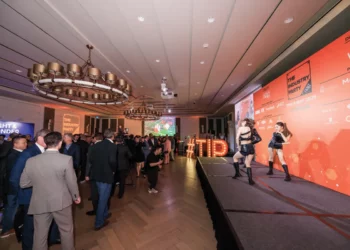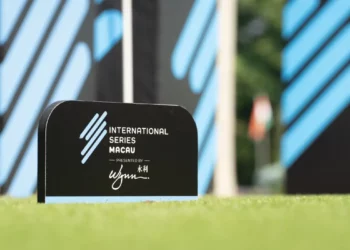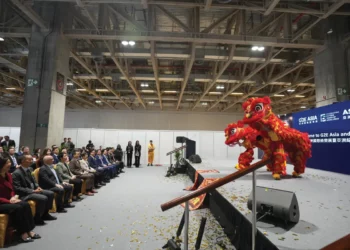21 Chen Lip Keong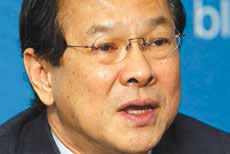
CEO and Executive Director
NagaCorp
Chen Lip Keong founded NagaCorp in 1995, the same year he obtained a 70- year gaming license in Cambodia and a monopoly until 2035 on casino operations within a 200-kilometer radius of the capital, Phnom Penh. He listed the company in Hong Kong in 2006 after Singapore rejected the listing, and the stock price has been climbing ever since (he still controls more than half of it). Between this year and last, the price doubled, partly on news that NagaCorp is expanding. In November 2012, the company broke ground on Naga2, which is expected to be operational by 2016. When it is, it will include new hotels, restaurants, entertainment and MICE facilities and an underground shopping mall.
NagaWorld is the principal asset of NagaCorp, which reported a 15% year-onyear increase in revenue in the first half of 2013 to US$152 million despite two business disruptions during the period, including a week-long period of national mourning in February after the passing of the king’s father and a holiday period of sorts in June in the lead-up to July’s elections.
The property is substantial by regional standards—660 hotel rooms, 1,700 electronic gaming machines and 170 live table games, 15 food and beverage outlets, a nightclub, a spa, 25,000 square meters of meeting space—and there are no statutory limits on gaming capacity. Naga2 will add a further 1,033 rooms, 200-300 table games and 500 EGMs.
Vietnamese players are NagaWorld’s mainstay, accounting for an estimated 35- 40% of main floor revenues. But VIP play, most of it Malaysian, is an increasingly important part of the mix. Chinese, not surprisingly, also feature prominently, and are the country’s fastest-growing visitor group. Five or so junkets are driving most of the high-roller volume, although the property has relationships with some 30 different operatives. Last year saw the opening of the company’s first sales offices in Ho Chi Minh City and Bangkok.
The property also is embarking on a “transformational” VIP program, in the words of investment analyst Grant Govertsen of Union Gaming Research Macau. New VIP facilities have opened at the property with more in the works (including 50 private gaming salons at Naga2), and new junket operators have been recruited to bring in players. In 2014, a private Naga terminal is scheduled to open at Phnom Penh’s international airport.
Mr Chen, who trained as a medical doctor before turning to property development and gaming, landed on Forbes’ list of billionaires for the first time this year on the back of NagaCorp’s surging share price. When he first made it onto Forbes’ “Malaysia’s Richest” in 2009, his net worth was estimated at US$195 million. Since then, NagaCorp’s share price has risen more than 500%.
His gamble on NagaWorld was a bold one. He put in the bid for the casino in 1994 as efforts were still under way to bring peace to Cambodia after years of civil war. With no experience in gaming, he set out to get into the business when the Khmer Rouge was still active and was not even clear whether the new government would survive. And he proposed making the investment well before regional mass tourism had taken off and a decade before Asia’s casino boom got rolling with the opening of Macau to competition.
The unlikely venture, launched on a barge on the Mekong River, got started slowly. But since then, NagaCorp’s success has closely tracked Cambodia’s progress as a nation and has grown with it. The first Cambodian company to list on the Hong Kong Stock Exchange, it has played an integral role in shaping the country’s increasing appeal among tourists, investors and the international business community.
22 Kazuo Okada
Chairman
Universal Entertainment Corp
His ugly and protracted falling-out with Steve Wynn drags on, and Kazuo Okada isn’t wavering in his determination to turn the tables on his former partner and accuser and reverse the battering his reputation has suffered. With equal doggedness he continues to pursue his Philippines “dream,” as Universal Entertainment characterizes the US$2 billion mix of high-end gaming and leisure attractions he’s counting on at Manila’s new Entertainment City resort complex to establish him as a regional operator to be reckoned with.
Mr Okada’s vision for Manila Bay Resorts, as it’s called, is indeed immense—2,000 hotel rooms, 3,000 slot machines, 500 table games, an expansive luxury residential component, the world’s largest oceanarium. He’s already pumped in an estimated $500 million. Ground has broken. Nothing short of a criminal indictment, and perhaps not even that, would induce him to relinquish it.
Looking at what it has cost him to date it’s obvious that the stakes couldn’t be any higher—by the boards went his friendship with Steve Wynn and a very lucrative investment in Wynn Resorts; it’s jeopardized his machine gaming business in the US, where he is also under investigation; it may well have led the South Korean government to reject his bid to develop a destination resort in Incheon; quite possibly it could doom any plans he might have for a casino franchise in his home country.
You could say he’s all in.
The good thing is that the powers that be in the Philippines appear to have little choice but to let him see it through despite the embarrassment his legal troubles has caused them, which is good for everyone concerned because there are still moments when it all seems dangerously close to unraveling.
His pressing need, as of this writing, was to secure a credible partner or partners to take a majority stake in the land under the resort and thereby resolve, or so it’s hoped, the criminal charges he and 25 Filipinos and Japanese connected with the project could face under a finding by the Philippines Justice Department that dummy companies were set up to evade rules on foreign ownership of land and other rights. Intertwined in this controversy is an alleged bribery scheme involving a politically connected businessman who is among those named in the ownership probe. This second and far more serious investigation had stalled at one point over the reluctance of witnesses to testify, but it appears now to have gathered fresh steam amid reports that the country’s former top gaming regulator may have been involved.
Universal denies any wrongdoing on both accounts, and Mr Okada, perhaps taking a page from Wynn’s success in ousting him, has countered with an investigation of his own into the bribery allegations, conducted in the friendlier confines of Japan, that has traced the “illegal flow of funds” into the Philippines, as the company terms it, to rogue executives.
With similar resourcefulness he’s working to slot in a new Filipino-Chinese money man as a partner—real estate and retail magnate Andrew Tan—to replace the old one—John Gokongwei, who exited the project earlier this year, reportedly because the two sides could not agree on terms.
A tie-up with Mr Tan, should Mr Okada pull it off, could solve a host of problems. Mr Tan’s Alliance Global has been involved with Manila Bay Resorts as a prospective investor in its residential component. Alliance also is one half of the joint venture that owns the Philippines’ largest and most successful casino, Resorts World Manila, and is licensed to develop one of Entertainment City’s four licensed megaresorts.
In the meantime, Universal says it is “cooperatively” working with the government, and has been for more than a year, to resolve the land ownership issues, and the company has been assured, it says, that it will have “until the completion of the development” to do so.
23 Kingson Sian
President
Travellers International Hotel Group
As the largest of the Philippines’ privately owned gaming resorts, Resorts World Manila, located across the street from Terminal 3 of Ninoy Aquino International Airport, was the precursor to the massive gaming and leisure complexes sprouting up at Entertainment City about five miles across town on Manila Bay.
RWM is owned and operated by Travellers International Hotel Group, a joint venture between Genting Hong Kong, a subsidiary of the Malaysia-based Genting resort conglomerate, and Alliance Global,a Philippine corporation with extensive holdings in residential and commercial real estate and food and beverage.
Prior to the opening of Resorts World, major casinos run independently of the government operator-cum-regulator, the Philippine Amusement and Gaming Corporation, had enjoyed only modest success in the country, with many citing corruption and meddling by PAGCOR and the government as reasons for their struggles. There were market-watchers who believed RWM would fare no better, and in light of the history, the US$800 million investment was a risky one. But Travellers, led by Kingson Sian, who also heads Alliance Global, arrived with the right product at, crucially, the right time and proved the naysayers wrong.
The property opened strong in 2009 in the midst of the global financial crisis and has sustained that performance ever since. Travellers reported a 24% year-on-year jump in consolidated revenues in the first half of 2013 to PHP19.1 billion (US$432.8 million), with profit up 25% to PHP2.3 billion.
Moreover, its success has inspired confidence among the developers of the Entertainment City IRs that conditions in the country are finally conducive to supporting big investments. And the long-awaited Entertainment City—first envisioned by PAGCOR almost a decade ago—is finally taking shape with the opening of the $1.2 billion Solaire Resort & Casino in March and with three other resorts under development at the complex or on the drawing board.
One of those is Travellers’ $1.1 billion Resorts World Bayshore, though the company has held off on getting it under way. According to Mr Sian, the focus for now is on maximizing returns at RWM, with Resorts World Bayshore expected to open no earlier than 2017.
The company intends to spend $600 million over the next three years to expand RWM. Its decision earlier this year to delay a planned $1 billion IPO will not interfere with that, it says. Instead, the expansion, which is slated to include 1,100 hotel rooms, a convention center and additional gaming space, might be funded through the debt markets.
“We are not pressured,” Mr Sian said of the IPO. “We will just wait for the right timing.”
In addition to serving as president of Travellers and president of Alliance Global, a position he has held since 2007, the 52-yearold Mr Sian holds executive positions with other subsidiaries and affiliate companies of the group.
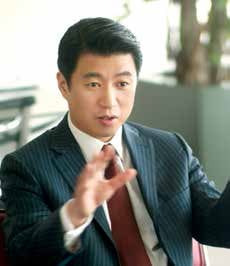
24 Philip Chun
Chairman and CEO
Paradise Group
South Korea’s foreigners-only casino sector, characterized by relatively small casino hotels serving mostly Japanese and Chinese players, faces the twin threats of the opening of new integratedresorts across the region and looming legalization of casinos in Japan. Paradise Group, the country’s leading foreigners-only operator, last year received long-awaited approval to develop the country’s first large-scale integrated resort to meet the challenge.
The South Korean government legalized foreigners-only casinos in 1967, and for most of the ensuing four decades Paradise Group has dominated the market.
In 1968, the company opened what is still the country’s best-known casino at the Sheraton Walker Hill Hotel in the capital of Seoul. Paradise now operates five foreignersonly venues, led by flagship Walker Hill, containing more than 79 table games and 160 slot machines, and as recently as 2005 controlled an estimated 90% share of revenue in the sector. It lost that lead following the government’s decision in 2005 to set up its own casino operating company, Grand Korea Leisure, under the auspices of the Korea National Tourism Organisation, with a remit to boost inbound tourism and generate income to fund tourism infrastructure and other government projects. GKL opened three casinos—two in Seoul and one in the port city of Busan— under its Seven Luck brand in 2006, and by 2010 had grabbed an estimated 54% of a foreigners-only market worth just over KRW1 trillion (US$885 million) a year. As the market expanded to 17 casinos in all, Paradise’s share contracted to around 30%.
Philip Chun, chairman of Paradise Group since 2004, has sought to reclaim his company’s lead in the market. In the second quarter of 2012, Paradise’s share was back up to 50% while GKL’s had dropped to 42%, with other operators combining for the balance. However, Paradise needs to continue to work to consolidate that lead, with GKL reclaiming the top spot briefly in the fourth quarter of last year, though it appears Paradise is ahead again in 2013. There is also one casino opened to Korean nationals, state-owned Kangwon Land in the remote northeast of the country, which debuted in 2000.
Going forward, a big factor in Paradise’s favor is that it is relatively more reliant on Chinese visitors, whose numbers are showing the strongest growth of all inbound markets. (South Korea is the third most popular destination, behind Hong Kong and Macau, for outbound Chinese travelers.) GKL is dependent more on Japanese patrons. Paradise also enjoys an additional revenue stream from its ownership of the largest casino in Kenya, Paradise Safari Park & Casino, with 40 tables and around 100 slots. And Paradise has been going strong so far this year. In the second quarter, revenue across its six casinos (including the Kenya property) rose 19.7% year on year to KRW127.7 billion (US$115 million).
One thing weighing against all the foreigners-only casinos is the imposition of a 4% casino consumption tax beginning in 2014. The government is also proposing an additional 10% leisure tax on Kangwon Land to raise funds for infrastructure development in its host Gangwon province ahead of the 2018 Winter Olympics. If that measure proceeds, a leisure tax may also be imposed on the foreigners-only sector, though probably at a lower rate.
Paradise, meanwhile, is investing heavily to compete within a regional gaming industry increasingly replete with comprehensive and luxuriously appointed resorts. In September last year, Paradise signed an agreement with Japan’s Sega Sammy Holdings, a leading manufacturer of pachinko machines, to develop a KRW800 billion (US$730 million) IR in Incheon featuring two five-star hotels, a convention center, concert hall, indoor theme park, shopping mall and casino, with a phased opening beginning in 2016. Some 450 table games are envisioned at full build-out—twice as many as Paradise operates now in all five of its casinos.
The joint venture company, Paradise SegaSammy, announced in July that rather than obtaining a separate license for the casino within the planned IR, it was going to develop the complex as an expansion of Paradise Casino Incheon’s current operations. This may have been a defensive move in the wake of the government’s rejection in June of casino license bids by Caesars Entertainment and Kazuo Okada’s Universal Entertainment, both of which were bidding to develop similarly scaled IRs in Incheon.
Mr Chun is also jockeying to position his company ahead of the expiration of Kangwon Land’s exclusive license to serve the domestic market. When that happens, it’s probable one or more licenses will be issued in what is already a massive and lucrative sector, and Paradise Group looks to be the odds-on favorite to secure one of them.
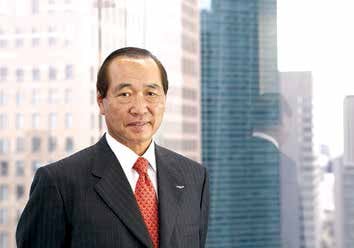
25 Hajime Satomi
Chairman, President and CEO
Sega Sammy Holdings
Hopes are high that Japan is on the verge of legalizing casinos.
In April, a cross-party alliance consisting of 140 pro-casino lawmakers in Japan’s parliament, the Diet, selected Prime Minister Shinzo Abe as their chairman and agreed on a plan to submit a draft casino bill during the Diet’s extraordinary session this autumn. Mr Abe has indicated he is open to the idea of casino resorts as part of his strategy for driving economic growth.
If the wisdom of stock markets is anything to go by, were casino licenses to be offered, Sega Sammy Holdings—which is developing a gaming resort in South Korea in partnership with that country’s Paradise Group—would be among the frontrunners to secure one. The company has seen a strong rally in its share price this year despite reporting a drop in profit in the fiscal year ended 31st March.
Sega Sammy stated a desire as far back as 2007 to invest in casinos in Japan should the opportunity arise, and last February, purchased a resort in Miyazaki Prefecture. Two months after that acquisition was announced, Chairman Hajime Satomi reasserted the company’s intentions, saying, “Of course, [a casino] is what we have in mind.”
Then, last September, the company signed the agreement with Paradise to develop an integrated resort in Incheon just minutes away from the international airport serving Seoul. The joint venture company, Paradise SegaSammy, has estimated the development cost at KRW800 billion (US$730 million), which includes two five-star hotels, a convention center, concert hall, indoor theme park, a shopping mall and a casino, with a phased opening beginning in 2016.
Sega Sammy was created in 2004 when Sammy Corporation bought a controlling interest in ailing video game giant Sega. The 71-year-old Mr Satomi, who heads the combined group, founded Sammy Corp. in 1975 and built it into one of the biggest suppliers of pachinko and pachislot machines in Japan—its major rival in the market is Sankyo Corporation. In the current fiscal year, Sammy says it will sell 260,000 pachinko machines and 365,000 pachislots.
Sega Sammy expects to generate 485 billion yen (US$4.9 billion) in total revenue in the current fiscal year, a significant improvement over last year’s 321.4 billion yen. Although it already ranks as one of Japan’s biggest companies based on recurring income, a casino license would propel it much higher. Investment brokers CLSA Asia- Pacific Markets estimates two casinos, one each in Tokyo and Osaka, would generate US$10 billion in annual revenue.
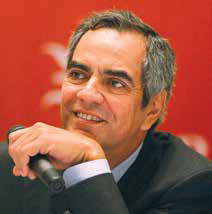
26 Enrique Razon Jr
Chairman
Bloomberry Resorts Corp.
Energetic, handsome, impossibly rich, Enrique Razon personifies the image Philippine gaming is eager to project of itself as an industry whose time has arrived.
The same could be said of his new Solaire Resort & Casino—sleek, contemporary, brandaware, affirmational—a total lifestyle play.
PSX-listed Bloomberry, majority controlled by Mr Razon, spent US$750 million to complete Solaire’s first phase, which opened in March as the first of four destination-scale casino hotels envisioned for Entertainment City, a 120-hectare development zone along Manila Bay the government is sponsoring in hopes of driving regional tourism and providing badly needed jobs. Solaire is in the midst of a $450 million expansion slated for completion next spring to contribute more rooms and restaurants, a spa and pool, high-end retail, a showroom and a bayfront promenade to the effort.
“The Philippines has more to offer actually than places like Macau and others,” Mr Razon has said. “There are many things to see here, and we’re coming from a very low base of visitors. It’s a tourist destination that has world-class gaming, so there’s something for everyone. That’s really what it has to end up as, not just gambling, which is what Macau is.”
Interestingly, his late father, the amiable and popular Enrique “Pocholo” Razon, who launched the family business with a successful bid for a Manila port franchise in the post- Marcos era, walked away from a partnership with Stanley Ho on a floating casino in the capital city.
His son, however, not only believes Bloomberry will recover its $1.2 billion investment inside of five years, as he recently told Bloomberg, he put in $200 million of his own money. He sees Solaire as the “springboard” for a gaming expansion strategy similar to the one by which he turned that port franchise into a global conglomerate, International Container Terminal Services, with operations in 18 countries. It’s made him the Philippines’ third-wealthiest man, with a net worth estimated by Forbes at $3.6 billion, and at 53 the youngest of those at the top of the list.
“We just have to build the brand,” as he says.
He’s gone a long way toward achieving that in what friends and colleagues describe as an uncompromising insistence on the very best, which he amply displayed in hiring Global Gaming Asset Management, founded by the men who put Las Vegas Sands on the map in Macau and Singapore, to run Solaire and offering them an ownership stake in Bloomberry.
“Ricky Razon knows how to take risks,” a Bloomberry director once said of him, “and he’s good at managing his risks.”
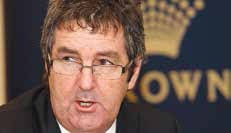
27 Rowen Craigie
CEO and Managing Director
Crown Limited
Under Rowen Craigie’s able stewardship, Crown continues to deliver solid underlying results in operating conditions in Australia that have become increasingly challenging, while pursuing an aggressive strategy of expansion at home and abroad.
Growing the business has been a struggle in the face of a sluggish domestic economy characterized by weak consumer sentiment. But James Packer’s right- hand man was able recently to report a creditable performance for the latest financial year, with pre-tax earnings at Crown Melbourne and Crown Perth up a combined 5%, adjusted for hold, on normalized revenue of A$2.77 billion, a 5.6% increase over 2012.
Significantly, VIP turnover grew 7.8% against tough competition in Sydney from Echo Entertainment’s refurbished and revitalized Star, leaving no doubt that the company’s flagship Crown Melbourne is losing none of its appeal as a preferred destination among Asian high rollers. VIP revenue there was up more than 9% year on year.
Combined revenue from main-floor gaming was up 3.6%. Revenue from hotels, F&B and other non-gaming attractions grew a robust 8.1%. Earnings on a per-property basis were strong at +7.1% in Melbourne, normalized for hold, and +6.4% in Perth, which has begun to reap the benefits of an expanded gaming floor and new restaurants, including a gourmet outlet targeting Crown’s sizable Chinese market. Work is progressing as well on a major hotel addition, Crown Towers Perth, which is scheduled for completion in 2016.
Rationalizing costs has been a priority for him as well, at Crown Melbourne particularly, where he’s been able to improve the overall operating margin and still grow an expensive VIP business.
In the midst of all this he’s found time to jet back and forth to Sri Lanka to nail down a joint venture for a $350 million gaming resort in Colombo and bring some touchy negotiations with the government over the design of the property to a successful conclusion.
Closer to home, the tentative approval granted the company’s plans for a $1.3 billion super-resort in Sydney has overshadowed plans that are quite expansive in their own right to take on Echo in Queensland. There, too, Mr Craigie has been the point man, wooing state and local leaders on Crown’s pitch for a destination-scale casino in Brisbane that would leverage the company’s strength’s in the international VIP trade.
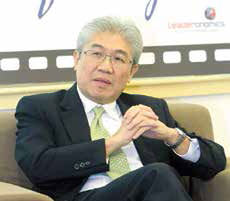
28 Lee Choong Yan
President and COO
Genting Malaysia Bhd
Genting Malaysia, listed on Bursa Malaysia with approximately RM23 billion (US$7 billion) in market capitalization, is one of the leading leisure and hospitality corporations in the world. Its portfolio includes Resorts World Genting in Malaysia, Resorts World Casino New York City and casinos in the United Kingdom.
The Malaysia operations consist of the Resorts World Genting flagship in Genting Highlands, about an hour from the capital city, Kuala Lumpur, together with a pair of resort hotels in Langkawi on the Andaman Sea in the northwest and in Kijal on the South China Sea coast. Together, these account for more than 60% of the company’s global revenues and 90% of EBITDA, and most of that comes from RWG, a complex of 8,000 rooms and suites in five hotels, theme parks and other family-oriented attractions, more than 100 food outlets, shops, an 18-hole golf course and MICE space. The resort, opened in 1970, holds the national casino monopoly, with a collection of 3,000 slot machines and electronic table games and 500 live tables across 200,000 square feet of gaming space.
The legalization of casinos in Singapore was viewed as a serious competitive threat to the aging RWG, but the venerable mountaintop property continued registering revenue growth even after the 2010 arrival of glitzy integrated resorts in the neighboring city-state.
Genting Malaysia’s revenue from home-country operations was up 4% year on year in the first half to 2.8 billion ringgit (US$857 million), though adjusted EBITDA declined 7% to RM950.7 million as a result of higher promotional expenses and contributions in support of the group’s social responsibility efforts. Resorts World Genting is striving to market itself as more than the low-rollers paradise it is perceived to be and to spend more aggressively to attract high-limit players from the wider region. In line with that the property is being revamped at a cost of RM3 billion (US$917 million) and expanded by 1,300 hotel rooms. The plan, slated for completion in 2016, includes a RM400 million joint venture with 21st Century Fox to develop a 25-acre moviethemed amusement park that will feature more than 25 rides and attractions based on Fox film brands.
In the US, Genting Malaysia operates Resorts World Casino New York City, a video lottery facility at the famed Aqueduct Racetrack in the borough of Queens. It contains a mammoth 5,000 gaming machines and has been growing steadily since its opening two years ago, driving a 4% year-on-year increase in the company’s revenue from US operations to RM454.6 million (US$138.6 million).
Genting Malaysia also is one of the largest casino operators in the UK, with 41 venues in the country, including six in London. The business has been less than stellar of late, with revenue down 5% year on year in the first half to RM773.1 million and adjusted EBITDA down 41% to RM97 million. To address the declines the company is focusing on growing its premium-player business in London and is expanding physically, with a major leisure and entertainment complex under development at the National Exhibition Centre in Birmingham, to be known as Resorts World Birmingham, slated for a mid-2015 opening.
Lee Choong Yan is responsible not only for Genting Malaysia’s corporate development but also for overall operations at its flagship Resorts World Genting. His steady hand is credited with having kept the home market solid in the face of mounting regional competition as the company pursues expansion opportunities abroad.
Mr Lee trained as a chartered accountant in London and worked as an investment banker in Hong Kong prior to joining Genting Group in January 1997. He also holds various directorships in other companies within the group.
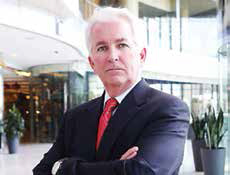
29 John Redmond
Chief Executive Officer
Echo Entertainment Group
It’s said that on John Redmond’s arrival at Echo Entertainment last fall he was given “Who Wants to be a Billionaire,” an unauthorized biography of James Packer. He’s professed to have read it, carefully, for some insight into what he might expect from his powerful rival down in Melbourne.
He didn’t have to wait long.
New South Wales Premier Barry O’Farrell was sold on a Crown casino on Darling Harbour to compete with Echo’s The Star months before he got there, and Crown’s no-bid proposal already was under review by a panel the premier had set up with a well-connected banker friend of Mr Packer’s in charge. Whether or not Mr Redmond knew that Echo’s longstanding monopoly in Australia’s largest city was doomed, he responded with a toughness honed by a career in “the most competitive market in the world,” as he has characterized his 27 years in Las Vegas, where he served as a regulator, held executive positions at Caesars Palace in its heyday and later ran the MGM Grand as president.
Correctly sizing up the hopelessness of the political situation he took Echo’s case to the public, defying a gag order imposed by Mr O’Farrell to pitch what he called “a win-win scenario for the people of Sydney”—two luxury hotels in partnership with a “prestige global operator” that may well have been resort giant Genting, which owns more than 7% of Echo, and $130 million in infrastructure improvements anchored by a pedestrian bridge linking The Star to Crown’s chosen location across the harbor. It was a bold plan, pegged at A$1.1 billion and promising 1,400 new jobs, and it came with a $250 million sweetener for the state in exchange for 15 more years of exclusivity. Alternatively, Echo offered to build the hotels and everything else, minus the $250 million, if Crown was held to the VIP-only table games casino it originally proposed.
“We don’t have a plan to lose, we only have a plan to win,” he said at the time.
He lost, of course.
The battle lines keep shifting too. In Queensland, where demand has fallen off and Echo’s three casinos are sorely in need of reinvestment, potential rivals are wooing the heavily indebted government with lavish resort proposals in Cairns and in Echo’s Gold Coast and Brisbane markets, Crown among them.
But Mr Redmond is not without a few resources of his own. In The Star he has inherited a beautiful property that’s been remade at a cost of $870 million, and he’s managing it well, cutting expenses and growing revenues, and reports are that a joint venture may be in the works with Genting, which has applied for approval to raise its Echo stake above 10%.
30 Michael French
Chief Operating Officer
Solaire Resort & Casino
Michael French joins the ranks of “The Asian Gaming 50” in a big way—he’s the guy in charge of Manila’s new Solaire Resort & Casino, one of the most anticipated gaming destinations to open in the region in recent times.
He joined Solaire in January 2012 and led its US$750 million first phase through to completion and its acclaimed debut this March. Over those 14 months the enormous machinery of a casino hotel had to be created almost from scratch. Marketing and advertising strategies had to be devised and executed. Some 4,500 people had to be hired and trained, and every one of them would be counting on him.
It’s a role Mr French knows well. He was The Venetian’s senior vice president of operations when it opened on the Las Vegas Strip under Bill Weidner and Brad Stone in 1999, and after six years as an executive and consultant in the US tribal gaming industry, he arrived in Macau in 2007 as SVP operations at Melco Crown Entertainment’s flagship City of Dreams, which he helped shepherd to its opening in 2009.
Not surprisingly, he was top of mind when Messrs Weidner and Stone secured the management contract at Solaire and went looking for the talent they would need to make it a success.
It’s been a bit of a struggle in the early going. Solaire’s first full month resulted in an operating loss that necessitated some price-tweaking and other adjustments. Then the marketing began to hit its stride. More junkets were brought on board. Loyalty club sign-ups quadrupled. EBITDA ramped up nicely, totaling PHP824.7 million over May and June ($18.5 million) for a blended operating margin of 25.6%. For the three months ended 30th June, Solaire generated PHP3.9 billion in gaming revenue ($87.5 million). Total net revenues for the quarter exceeded PHP4.1 billion.
Next: The Asian Gaming 50 – 2013: 31-40







